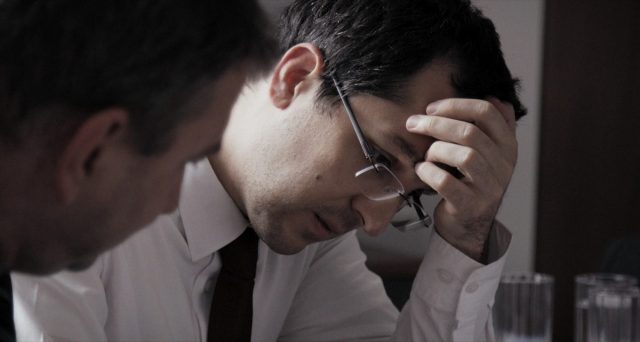AFI Fest 2020: Collective, by David Bax

We sometimes seem to forget that cinema ought to be just as much a part of documentaries as fiction films, overly praising docs for their righteous messages or agreeable subject matter. That said, there are instances in which a documentarian finds a true story so compelling that all they really have to do is stay out of its way. With Collective, Alexander Nanau has more or less done just that. The tale he unfurls here seems like it could have been written for the screen, right from the inciting incident (and, essentially, logline), a fire in a nightclub that was the first domino to fall in a series of events that uncovered a system of government-wide corruption.
That’s not to imply that Nanau treats the 2015 Colectiv night club fire as the stuff of cheap entertainment. 27 people died at Colectiv that night and more of them–too many more, which is what raised eyebrows–died in the hospital after. With phone footage of the fire’s outbreak that’s so immediate as to be sickening, tales of burn victims’ wounds allowed to fester with maggots and plenty of focus on the survivors and their trauma, Collective pays its respect to those who suffered because of multiple levels of government malfeasance and inspires the same indignant fury that led reporters at Romania’s Gazeta Sporturilor to investigate the state’s health care system and the culture of bribes and nepotism that hollowed it out and left it shamefully ill-equipped to handle a large scale crisis.
If Collective ever comes close to fumbling its stories, it’s in the scenes set at Gazeta Sporturilor. These journalists did priceless work but they don’t seem to be the best subjects, playing overly to the camera. It sometimes seems as if they’re attempting to collaborate with Nanau on the documentary.
That’s a minor complaint, though, about a film so stunningly revelatory as Collective. The pervasiveness of Romania’s corruption–a byzantine system of bribing people in order to get into a position to receive bribes of one’s own–is so ludicrous that one reform-minded minister can only laugh at it. It’s a wonder the hospitals functioned as long as they did. Collective could be seen by those already predisposed to this way of thinking as an argument against government-run health care.
But Nanau isn’t ultimately making a film about health care or about the Romanian government, not really. Collective‘s most passionate aim, it would seem, is to make the case for good journalism as the most potent corrective to societal ills. As such, Collective is successful at more than just relating a hell of a yarn.





























